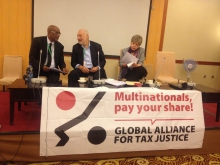Tax Justice for Social Justice

Taxation is critical to financing for development. It’s a powerful tool for poverty reduction - enabling sustainable investment in public services, infrastructure and other development needs. While the problems are systemic, solutions include ensuring all countries have an equal say in deciding fairer international tax rules, curbing tax avoidance, eliminating illicit financial flows, ending harmful tax incentives and ‘tax wars’, and building progressive and effective national tax systems.
Everline Aketch from the National Union of Educational Institutions /Public Services International, Uganda took the floor and said that:
"It is estimated that developing countries will require between $3.3 and $4.5 trillion a year to implement the SDGs – which range from universal education, public health care and sustainable energy provision to universal access to clean drinking water and adequate sanitation – in a context where they already face a $2.5 trillion annual investment gap. In the water and sanitation sector alone, the annual financing gap is estimated at $26.7 billion.
Leading international institutions emphasise the role of private finance in achieving the SDGs, despite major concerns. The idea that private finance can bring the needed investment is remarkably persistent in global policy circles and leads to a dangerous lack of attention to the far more realistic option of mobilising public finance for infrastructure to provide essential services for all.
Key elements of this agenda should be building efficient and fair tax systems as well as fighting corruption, tax evasion, and illicit financial flows. International aid can be strategically targeted to support improved taxation systems, including the ability to tax foreign investors. Finally, good governance is a precondition for public finance to be used efficiently and benefit the whole population. This is ultimately about democracy.
While the proponents of PPPs promote it as a panacea to address lack of resources, equity and quality, there are alternative propositions and excellent examples that do not require relinquishing education, health and water as public goods and state responsibility. Innovative domestic resource mobilisation through progressive taxation and other means can address the resource gap in a sustainable manner.
In Uganda, resources for education are still sorely lacking, while tax exemptions continue to be granted to foreign investors. This is unacceptable.
In Africa, we have to seriously consider the risk of capture of our hard won state sovereignty and the capacity to develop our human resources: healthy, educated and independent citizens, instead of moving into a new era of neo-colonization through the sell-off of our most essential services.
Tax justice can only lead to social justice if public resources are directed towards to financing of quality public services – universal access to health, education and water, which are the real drivers of social and economic development. We need to work together to change the discourse on what is needed to reach our goals and how we are going to get there."
Other speakers included Nobel Prize winner Joseph Stieglitz and Alicia Bárcena, UN Executive Secretary, Economic Commission for Latin America & the Caribbean.
This event was organized by the Addis Ababa CSO Coordinating Group and the Women’s Working Group on FfD, on behalf of the CSO FfD Group. Facilitating organizations are led by the Global Alliance for Tax Justice [Tax Justice Network-Africa; la Red de Justicia Fiscal de América Latina y el Caribe (hosted by Latindadd); Asia Alliance for Tax Justice (hosted by Jubilee South - Asian Peoples' Movement on Debt and Development); Tax Justice-Europe (hosted by Eurodad); North America Alliance (hosted by The FACT Coalition/TJN-USA, and Canadians for Tax Fairness)]; together with ActionAid, Christian Aid, Global Policy Forum, Oxfam, Public Services International, Save the Children, and Society for International Development.
Public Services International and its civil society partners are calling for an Intergovernmental tax body so that all nations stop losing billions in tax income. We also call for real safeguards for Public-private partnerships and the exclusion of health, education and water from the promotion of PPPs in this agenda
For more information on PSI's activities at the FFD3 see:
- The CSO FfD Forum Joint Statement
- The side-event report: Tax Justice for Social Justice
- The side-event report: How can the private sector have a positive impact on sustainable development?
- The side event report: Mission Impossible: Development without public services
- PSI General Secretary, Rosa Pavanelli, statement to the Round table on tax justice
- PSI Regional Secretary, Jocelio Drummond, statement to the round table on trade
- The ICRICT event Tax is a matter of life or death
- PSI's work on the Post-2015 Development Agenda
- See the statement signed by 150 organisations on private sector participation in the implementation of Post-2015 Sustainable Development Agenda
- PSI's Briefing on the FfD process
- PSI's Briefing on the SDG and Post 2015 Development Agenda process
- The UN website to find out about the Post-2015 Development Agenda
- The UN website on Financing for Development (FFD3)
- The CSOs for FFD3 website

